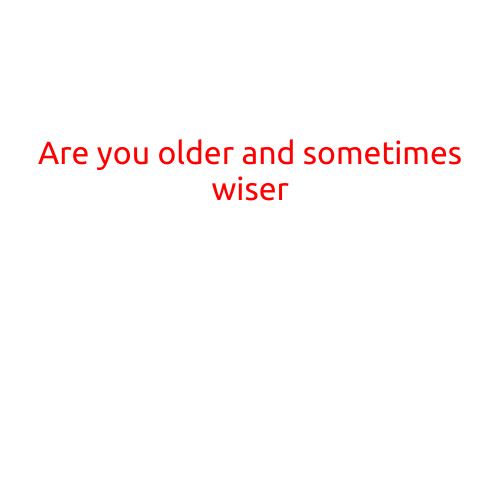
Are You Older and Sometimes Wiser?
As we age, we accumulate wisdom, life experiences, and a healthy dose of perspective. But what does it mean to be older and wiser? Is it a fixed state or a fluid process? In this article, we’ll explore the role of age and experience in shaping our wisdom, and how we can continue to grow and learn throughout our lives.
The Wisdom of Age
As we grow older, we’re exposed to more challenges, setbacks, and triumphs. These experiences shape our understanding of the world and ourselves, equipping us with valuable insights and skills. As we accumulate knowledge and wisdom, we’re better equipped to navigate life’s complexities, make informed decisions, and cultivate meaningful relationships.
Research suggests that older adults tend to perform better on tests of cognitive ability, such as memory and problem-solving, compared to younger adults. This is often attributed to the concept of “differential aging,” where different parts of the brain are affected by aging at different rates. While some areas may decline, others may actually improve with age.
The Benefits of Advanced Age
As we age, we’re often more:
- Patient: The wisdom of age brings a greater sense of patience, allowing us to take the time to think before acting and make more thoughtful decisions.
- Empathetic: Our life experiences and relationships give us a deeper understanding of others, making us more empathetic and compassionate.
- Reflective: As we look back on our lives, we’re forced to reflect on our choices and experiences, helping us gain a greater appreciation for what’s truly important.
- Resilient: Older adults have faced more challenges and setbacks, making them more resilient and better equipped to cope with adversity.
- Authentic: As we age, we’re often more authentic, having shed the masks and pretenses we may have worn earlier in life.
The Challenges of Age
While aging can bring numerous benefits, it’s not without its challenges. Many older adults face:
- Physical limitations: Age-related physical decline can make it harder to participate in activities and maintain independence.
- Social isolation: As friends and family members pass away, older adults may experience feelings of loneliness and disconnection.
- Loss of status: Ageism can lead to societal biases and stereotypes, making it difficult for older adults to feel valued and respected.
- Mental health concerns: Older adults are more likely to experience depression, anxiety, and other mental health issues due to a combination of factors, including loss, isolation, and declining physical health.
Maintaining Wisdom with Age
So, how can we continue to grow and learn throughout our lives? Here are a few tips:
- Stay curious: Maintain a sense of curiosity and openness, always seeking out new experiences and knowledge.
- Refine your communication skills: Focus on developing strong, empathetic communication skills to build deeper connections with others.
- Practice self-reflection: Regularly reflect on your thoughts, feelings, and actions to gain greater insight and wisdom.
- Seek out mentors: Find mentors or role models who can provide guidance, support, and valuable advice.
- Stay engaged: Stay engaged with the world around you, whether through hobbies, volunteering, or other activities that bring purpose and fulfillment.
Conclusion
Being older and sometimes wiser is a unique and precious gift. While it brings its own set of challenges, it also offers numerous benefits and opportunities for growth. By embracing our age and experience, we can continue to cultivate wisdom, empathy, and resilience, and live a fulfilling life that’s true to who we are.





